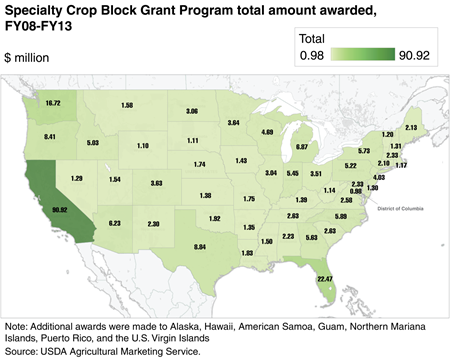
Specialty Crops
Specialty Crops: Title X (Horticulture), Title I (Commodities), Title III (Trade), Title IV (Nutrition), and Title VII (Research)
Provides incentives for marketing and promotion of horticulture crops, data and information collection, plant pest and disease management, food safety education, and programs to facilitate the inclusion of fruits and vegetables in school feeding programs.
Highlights
- Reauthorizes specialty crop block grants with increased funding and extends to include authorization for multi-State projects, with the amount of grants to a State based on production value and acreage.
- Expands the Specialty Crop Research Initiative (SCRI) and the Farmers Market and Local Foods Promotion programs.
- Expands the Fresh Fruit and Vegetable Program for schools; a pilot program will evaluate inclusion of canned, frozen, or dried fruits and vegetables in the program.
- Consolidates the Plant Pest and Disease Management and Disaster Prevention Programs and the National Clean Plant Network; baseline funding is increased.
- Reauthorizes the Tree Assistance Program (TAP; Title I).
- Extends funding through fiscal year 2018 for initiatives on market data and food safety education, as well as trade promotion programs including the Market Access Program and Foreign Market Development programs, and the Technical Assistance for Specialty Crops program (Title III), which addresses sanitary, phytosanitary, and technical barriers to specialty crop exports.
New Programs and Provisions
Emergency Citrus Disease Research and Extension Program (Title VII)—Competitive grants are awarded within SCRI toward scientific research and activities, technical assistance, and development activities to combat citrus diseases and pests.
Local Food Production and Program Evaluation Study (Title X)—Effort will gather data on production and marketing of locally or regionally produced food products and the regulatory compliance costs (direct and indirect) associated with the production and marketing of these products. The study will facilitate data sharing and will monitor programs designed to aid local and regional food systems.
Pilot program on Procurement of Unprocessed Fruits and Vegetables (Title IV)—Established for schools to facilitate procurement of unprocessed fruit and vegetables in not more than eight States receiving funds from the Richard B. Russell National School Lunch Act (42 U.S.C. 1755).
Pilot project for Canned, Frozen, or Dried Fruits and Vegetables (Title IV)—Aims to evaluate the impacts on consumption of allowing schools already participating in the Fresh Fruit and Vegetable Program in at least five States to offer these processed products as options; project will also evaluate impacts on school participation in the program.
Repealed Programs and Provisions
Grant Program To Improve Movement of Specialty Crops, which addressed transport deficiencies and cost effectiveness of movement of specialty crops to markets, is repealed.
Economic Implications
- Building on the 2008 Farm Act, research remains a cornerstone of programs for specialty crops. The SCRI and Specialty Crop Block Grants facilitate partnerships between industry and public research in enhancing and promoting competitiveness of the horticulture sector. Establishing authority for regional collaborations in the block grant program (previously, each grant was limited to single States) will promote efficiencies in addressing issues such as food safety, plant pests and disease, and crop-specific projects that cross State lines. Mandatory funding established for SCRI will avoid research disruptions.
- The role of fruits and vegetables in improved nutrition is supported through expanded nutrition programs for schools. Selected States will be allowed to use multiple suppliers and geographic preference in the procurement of fresh fruit and vegetables for school feeding programs. Criteria for selecting State participants include representation of different regions, quantity and variety of local fruit and vegetable growers, commitment to farm-to-school programs, and geographical locations.
- Reauthorization of the Tree Assistance Program (TAP) with mandatory funding provides disaster assistance for tree crops, vines, and bushes in designated disaster areas. Assistance may cover up to 65 percent of the cost of replacing trees and up to 50 percent of the cost of salvaging damaged trees or preparing land for replanting. The program is made retroactive to cover losses starting on October 1, 2011, which should help to address the effects of drought, severe winter weather, and other natural disasters since that time.
- Controlling the emergence and spread of plant pests and diseases is critical to horticulture crops. The National Clean Plant Network, which operates under USDA auspices, was created to produce clean plant material (free of pests and diseases) and maintain blocks of pathogen-tested plant material in sites throughout the United States for pathogen diagnosis and elimination. The network makes clean plant material available for use by State-certified plant programs, nurseries, and producers. Merging the network with management and prevention programs will allow closer coordination in mitigating plant pests and diseases.


